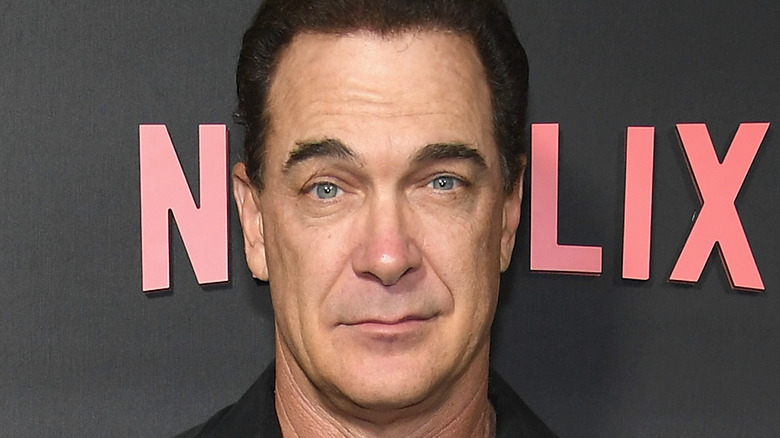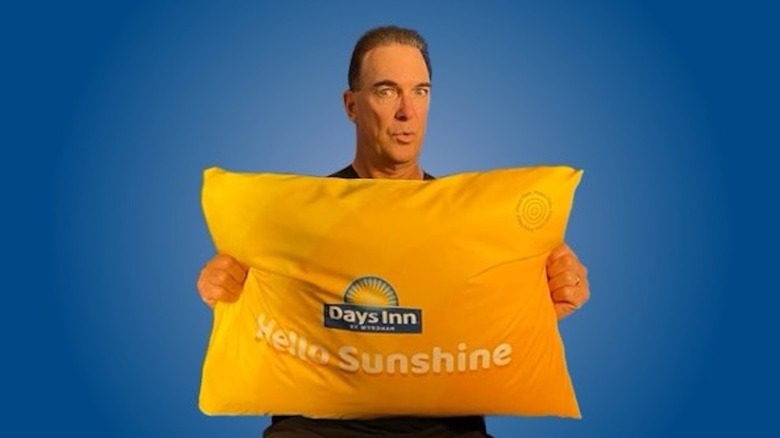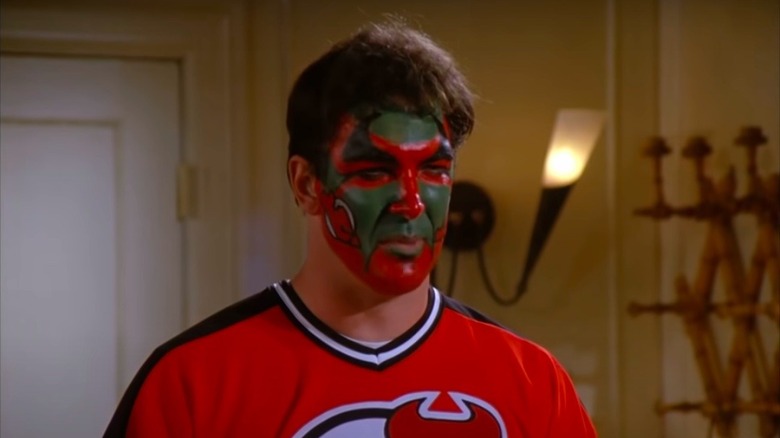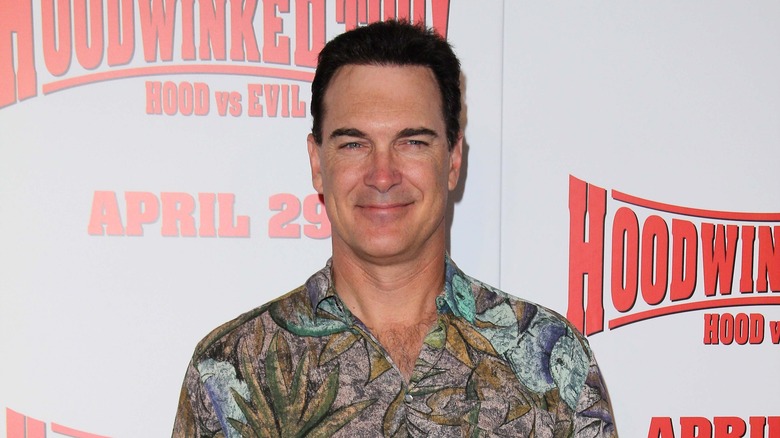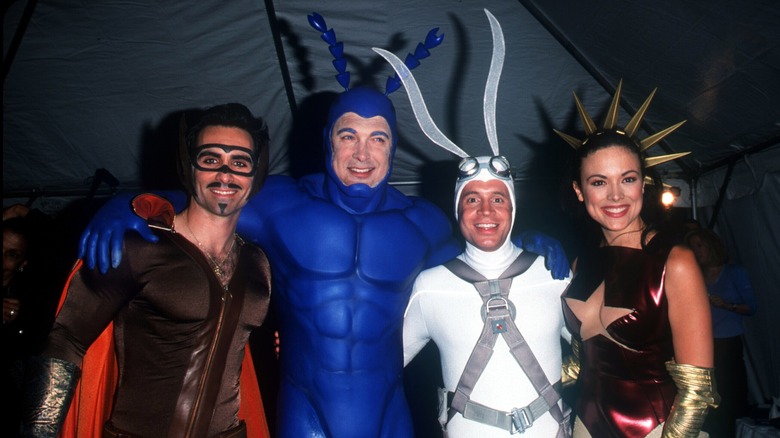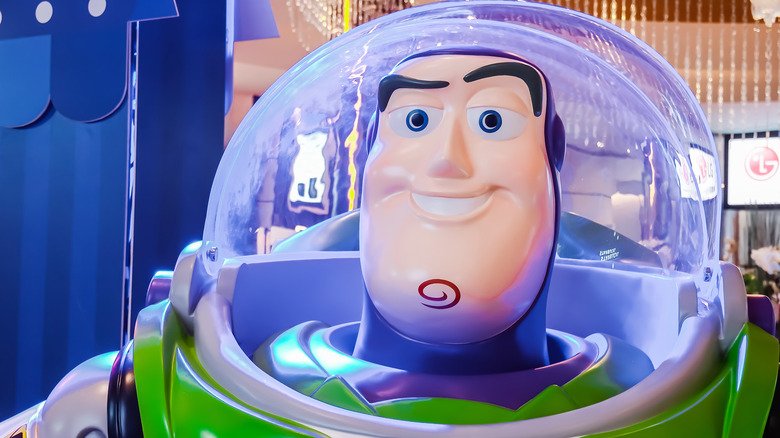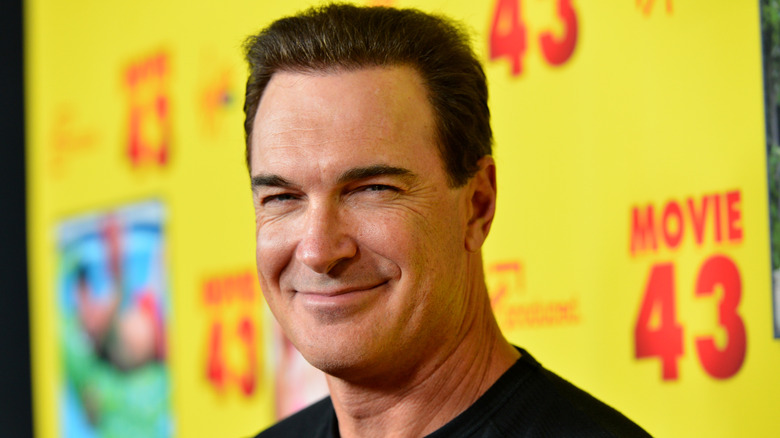Patrick Warburton Talks Days Inn's 'Complimentary' Pillow And More - Exclusive Interview
Actor Patrick Warburton has built up an impressive roster of screen credits since the late 1980s, beginning with television guest spots in such series as "Quantum Leap," "Northern Exposure," and "Murphy Brown." Since then, he has appeared in dozens upon dozens of films and TV series, including being a series regular on "Less Than Perfect" (which aired from 2003 until 2006), "Rules of Engagement" (2007-2013), and Netflix's "A Series of Unfortunate Events" (2017-2019).
Thanks to his distinctive voice, Warburton is also one of Hollywood's most sought-after voice actors, with a roster of roles ranging from Joe Swanson on "Family Guy" to Brock Samson of "The Venture Bros." to Kronk in "The Emperor's New Groove" to Buzz Lightyear (voicing Tim Allen's "Toy Story" character in various animated Disney TV series). Of course, one role looms larger than all others: David Puddy, the on-again, off-again boyfriend of Elaine Benes (Julia Louis-Dreyfus) on "Seinfeld."
For his latest gig, Warburton is providing the voice of the new "complimentary" pillow available at select Days Inn by Wyndham hotels, a pillow that offers guests feel-good compliments with the touch of a button. In an exclusive interview with The List, Warburton discussed his new role with Days Inn, reflected on why "Seinfeld" remains such a big part of his career, and gave his thoughts on Chris Evans taking over the role of Buzz Lightyear in the new animated film "Lightyear."
How he became the voice of Days Inn's 'complimentary' pillow
What can you tell me about your new role with Days Inn as the "complimentary" pillow?
When it got pitched to me, I thought it sounded whimsical and fun, silly, positive. I laughed at the idea of being the first voice that somebody might hear in the morning, with a nice compliment — a complimentary pillow that compliments you.
Would it be fair to say that outside of, say, "Beauty and the Beast," you're the first talking pillow?
That could be. I don't know if we're going to build a whole show around this talking pillow. I doubt that's going to happen.
Have you had a chance to try the pillow out to see how it works and how it actually functions?
Right here. Here we go. Let's see. [Pillow speaks] "Who's going to rock it today? You are. You're going to rock it today." That's very enthusiastic. [Pillow speaks again] "Rise and shine, good looking. It's time to seize the day." I also compliment your hair — I think at one point, I say, "Boy, your hair smells terrific. I don't know what products you're using."
Did you get a chance to improvise and come up with your own compliments, or were they all scripted?
Probably half of them were mine [that I made up] on the spot — fun, silly things. The one where I say, "Your hair smells terrific," that was [improvised]. There might be one [like], "Oh, starting the day together. We're going to do great," or something like that. I don't know. It was a little while ago when we recorded these.
Was the process of recording it different from the way you would typically record voiceover stuff?
In a way, yes, because they're all individual sound bites. You're not doing scenes. They're just individual sound bites where you're complimenting whoever it is waking up. They press [the pillow], and you try to help start their day and put a smile on their face, get them to be positive and not grumpy. That's what Days Inn is all about. You wake up well-rested, and now you might even get a compliment, but it's only at a select few Days Inns. In a way, it's like the golden ticket in Willy Wonka, except it's a pillow with me complimenting you, and you also don't win an entire chocolate factory. It's not quite as great as the golden ticket in Willy Wonka. That was a bad comparison.
But [recording these was] fun and easy. I have a little bit of a recording studio at the house, so I was able to do this at home and record with them and we could do it. We came up with some fun sound bites of fun things to start people's day with.
How 10 episodes of Seinfeld defined his career
You've done so many different projects over the years, but everybody always seems to come back to "Seinfeld." Yet you didn't appear in that many episodes. Why do you think that still looms so large in your career?
When you're part of something that's in perpetual syndication and is ... I hazard to say, I won't ever do anything that's out there as much as "Seinfeld" has been and seems to always be. It's something that seems to be ever-present. It's a good thing. I actually did nine regular-season episodes — 10 including the final episode.
But people always seem to go back to "Seinfeld." The most meaningful and one of the greatest opportunities I had was a few years ago. I got to spend the better part of two years in Vancouver doing "A Series of Unfortunate Events" with Barry Sonnenfeld, which was ... That was a lovely show. I busy myself throughout the years, trying to do different things and reinvent, but it is tricky when you do nine episodes of a sitcom and are in danger of being typecast.
I find that in a creative industry, oftentimes they seem to lack creativity in regards to casting. They put you in a box. Whenever I've had opportunities to do something very different, like "The Dish," or "The Woman Chaser," or "The Civilization of Maxwell Bright," even "A Series of Unfortunate Events," [playing] Lemony Snicket ...
Barry Sonnenfeld is an amazing creator and filmmaker, and he's a legend. Fortunately, I have friends like Barry Sonnenfeld who can see outside [the box] and they realize that you don't do just one thing. But even when I did "The Dish" in Australia years ago with the Sam Neill, this lovely film about the Apollo 11 mission from the Australians' perspective, I'd inquired with them. I said, "How do you know me?" They go, "'Seinfeld.'" I played the NASA exec in the film who oversees this entire operation. I said, "I'm maybe the least funny character in this entire film. What made you think that I could do this?" They said, "Oh, we reckon you could do it." Thank God for Rob Sitch, Working Dog [Productions], and the Aussies for giving me the opportunity years ago.
In Los Angeles, they don't seem to see things that way. With "A Series of Unfortunate Events," if it wasn't for Barry Sonnenfeld and Daniel Handler, who wrote the books and knew me from another film, I wouldn't have been on Netflix's top 200 list of guys to play Lemony Snicket. It's just the way the industry works. Sometimes they can't imagine you being or doing something else.
Does that give you a certain level of frustration, knowing that you do have that ability to stretch and do more than the kinds of things you're being offered?
It's not that frustrating. I've had a lot of opportunities and been able to do things. In the wider realm of things, it still does at times present a challenge, but it's not that big of a deal.
He was 'screwed over' by disgraced movie mogul Harvey Weinstein
You also do a lot of voiceover work for animated series. Is there one that stands out to you as a favorite that you keep coming back to?
Always, the one nearest and dearest to my heart would have to be Kronk [from "The Emperor's New Groove"]. Being a Disney-phile — it was in my early days — I got to create the character. I got to discover and create what he sounded like and present that. The makers of the film loved it, and that's what we went with.
There are a lot of characters. I love doing Brock Samson in "The Venture Bros." Joe in "Family Guy," for years, has been huge. It's so much fun to be a part of a show like that. That's also a part of pop culture and transitions with the times. "The Bee Movie" — I love working with Jerry Seinfeld. He's got a very unique comic sensibility.
I loved doing the Wolf in "Hoodwinked." That was a fun project, although I got screwed over by Harvey Weinstein — very much so. When I did "Hoodwinked," it was an independent production. It was an independently produced animated feature. When I signed on to do it, I said, "Listen, I have to have some kind of back-end deal, since we're just getting paid scale. Let's say, hypothetically, this becomes the first independently produced animated feature to get a major theatrical release. In case that happens, I need a contract."
I had a contract, and then Weinstein saw it at the Berlin film festival. They bought it and they put it out there. Now Weinstein is in the animation business — a Weinstein film. It's not a Weinstein film; they just bought it and they put it out there.
I go, "Well, now it is the first independently animated feature to ever get a major theatrical release. I have a contract." Harvey said, "Sue me." That's what he said: "Sue me."
He's got a cadre; he's got 20 lawyers that you got to keep busy, and it'll be more trouble than it's worth. It was interesting to be one of the four main voices in a film that between domestic and worldwide and DVD made at least $250 million ... I made a total of about $20,000 on that movie because Weinstein ... He was used to screwing everybody over, and he got away with it. I had a manager at the time who wouldn't even tangle with him. She's like, "Well, it's Harvey Weinstein."
Anyway ... He's getting his comeuppance, isn't he? Obviously, there are many of those who were treated way worse and got way worse from Harvey Weinstein, but that's my ... This is only my personal experience I speak of. That's the kind of person that he was, anyways.
Well, there's an argument to support the idea of karma.
Yes, absolutely.
He still has a soft spot for The Tick
One of my favorites of all your past projects was "The Tick." I love that show, and it's developed a bit of a cult following over the years. Do you still get recognized for that, or do people still ask you about that a lot?
Oh, yeah. That has its own special place, those nine episodes we did in 2000. We were over at Fox. This was before they were making single-camera, half-hour shows. We were a little ahead of our time, and it was a little expensive, and they didn't get it over there.
One of the big execs at Fox at the time was confused and wanted to know if all of us really needed to wear costumes, so that's what you're dealing with sometimes when you're dealing with TV execs. They didn't do anything to support or promote the show — we were supposed to go on Sunday nights, after "The Simpsons," I think. They held the show for a whole year and didn't put it out there. Then they threw us up on Thursday nights against the second year of "Survivor" — it was impossible to get good numbers. They intentionally set us up to fail, and that was it. 20 years later, it still seems to have a life.
He has no advice for Chris Evans about voicing Buzz Lightyear
You've also voiced Buzz Lightyear in parallel with Tim Allen. Now, Chris Evans is doing it for the new "Lightyear" movie. Did you have a chance to speak with him or give him any advice? Do you have any advice that you'd have for him?
No, I have no advice for Chris. Whenever it's your opportunity to voice a character, you make it your own. Chris, being the talented and creative individual he is, will make it his own. Even when I did the TV series, I didn't talk to Tim [Allen] before that. My Buzz was very different than Tim's Buzz. Throughout the years, and throughout time, there will be many different artists who voice the character of Buzz or portray Superman live-action, or even The Tick.
Peter Serafinowicz did the latest live-action version of The Tick, and we didn't have any communications. You try to make things your own, but there are these characters and superheroes that go on. There will always be many different Batmans and Supermans and The Ticks and Buzz Lightyears, for sure. Whoever the artist is who is honored with stepping into those shoes, it's their opportunity and responsibility to create something special and unique — which is what Chris is doing. I've just seen a little bit of it, but it looks like it's going to be absolutely amazing.
Patrick Warburton's secret to giving good compliments
As you said with your experience with Kronk and "The Emperor's New Groove," do you approach something differently when you've basically created the character and you've had a part in working to develop the characterization, versus stepping into something like Buzz Lightyear, where it's already a very specific character people recognize very well?
With Buzz, he's a take-charge kind of guy, and he's by the book. It's easy to get into the persona of a Buzz Lightyear. You're not really changing your voice or personal voice. The reason that you're doing it is because at the very foundation, you have a vocal tone and quality that they want for this character. At that point, it's about being expressive or being — at times — vulnerable, or bringing dimension to a character like that. But Buzz Lightyear might be a little bit easier than ... With Kronk, there's a little bit more room to be creative.
Producers can have a couple of pages of a character description, but when it's an animated character, they don't know what that character sounds like until they hear it. That's why that's a great opportunity to experiment.
I remember early, early conversations with them. I said, "He's this big guy, he's a henchman, but he seems to be reticent in his position. He's also a cook. Instead of him sounding dark like this, I made him sound a little bit sweeter, like this, and bring it down. And he likes to cook." They're like, "That's it."
It's really fun to be able to step into a room [and] show them what a character sounds like. In that entire creative process, everything feeds everything once you know who the character is [and] what he sounds like. Then you're stepping into those shoes and running with it. The process is a lot of fun, especially when you're working with so many wonderful creative individuals like you do with Disney, from all the animators.
That's what I love about doing animation — watching everything come together at the very end. When you're a voice actor, you're just lending your voice. When you see the final product off the storyboards and all of the sudden see it all come to screen, it's so much fun to see all the great work that everybody put into it and how it all came together.
Before we wrap up, I wanted to circle back to Days Inn and ask: What's the secret to giving a good compliment?
Meaning it. You have to be genuine. Sometimes, it's nice to boost somebody up. This is a great concept because Days Inn, it's a company where ... Their foundation is upon getting a good night's rest and being good for the day. What better way than a talking pillow, a complimentary pillow that gives you compliments? It was fun, silly, [and] very positive, and I thought it'd be fun to do, so that's why I climbed on board.
The new "complimentary" pillow is available until July 30 in select Days Inn locations throughout the summer.
This interview was edited for clarity.
